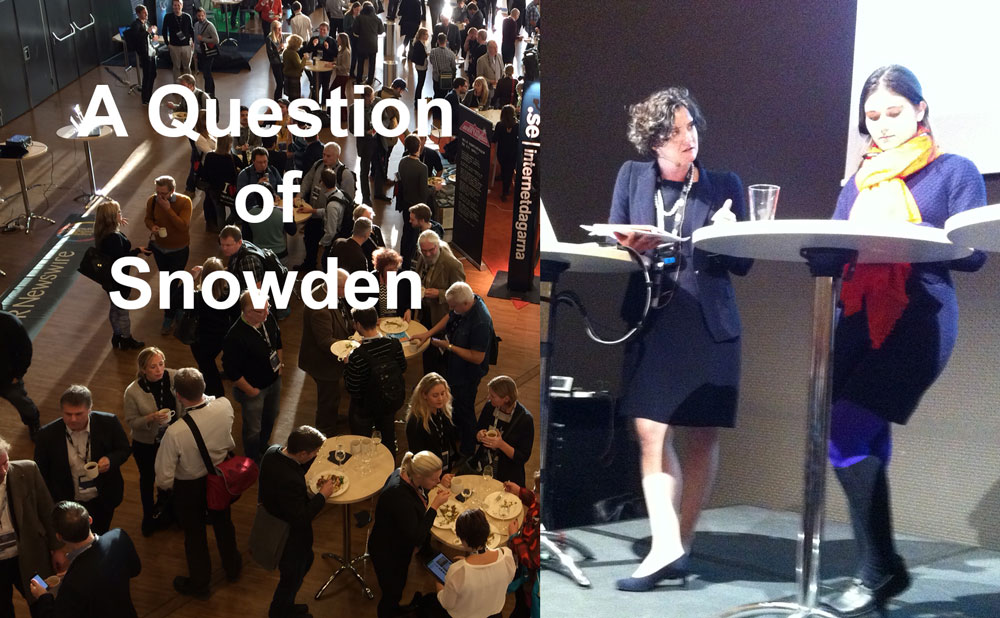Moderating Privacy post Snowden at Internetdagarna

By Emily Taylor
While the British continue to obsess about Internet security, the Swedish have been hosting challenging policy dialogue fora which place freedom of expression and human rights at the centre. I recently moderated a session on “Privacy on the Net post Snowden” at the Stockholm Internetdagarna. The session focused on three of the Snowden revelations:
- Project PRISM. Secret orders under the Foreign Intelligence Surveillance Act (FISA) and the alleged collusion of Internet companies in giving access to the US secret service (NSA)
- TEMPORA. Wire tapping direct into fibre optic cables, with the active assistance of the UK’s GCHQ. It is alleged that the Swedish signals intelligence agency (FRA) has also been involved.
- Deliberate weaking of encryption protocols.
On the panel were Amelia Andersdotter of the Swedish Pirate Party and the youngest member of the European Parliament, David Mothander, Nordic Policy Council for Google, and Robin Wilton a privacy speciaiist for the Internet Society. Although representatives of the US, UK and Swedish security services were invited to participate, all declined.
<div class="vid"> <iframe src="//www.youtube.com/embed/ENG6MIctNuA" style="position: absolute; top: 0; left: 0; width: 100%; height: 100%; border:0;" allowfullscreen title="YouTube Video"></iframe> </div>
An opening show of hands revealed that the audience unanimously believed that the Snowden revelations of mass surveillance were credible. The audience also indicated that they as individuals are now more careful about the views that they express online, suggesting that the belief in surveillance may already be creating “chilling effects” on freedom of expression.
Amelia Andersdotter, MEP, emphasised the role of the EU as legislator, and advocated the imposition of sanctions for companies such as Google, whom she believed to be in breach of EU Data Protection laws.
The Google representative, David Mothander, expressed the view that this would impose trade barriers (which seemed to be a veiled threat of legal action), and that the solution was for states to impose uniform rules or MLATs to eliminate conflicts of laws. One audience member pointed out that such negotiations would take years, and would no doubt be watered down in the end – better for the EU to take direct action, as had been done successfully against Microsoft.
According to Robin Wilton, the revelations have highlighted a clash of visions on either side of the Atlantic. In the EU, commerce sometimes has to take second place to human rights, but in the US, economic activity appears to hold the trump card.
Good governance is about opening yourself up to challenge by people who don’t share your goals, your perspective
The speakers agreed that there’s a need for more effective accountability and oversight of security services in democratic nations. But there was less agreement about whether the current multistakeholder governance of the Internet was the cause of the problems, or the solution. Google appeared to be calling for intergovernmental treaties – a marked change in the organisation’s lobbying lines – while Amelia Andersdotter said that multistakeholder mechanisms downplay the vital role of legislators. Only ISOC continued to wave the multistakeholder flag as the “worst form of governance – except for all the others”.
Overall, the willingness of the Swedish Internet community to discuss the challenging issues that the Snowden revelations raise is in stark contrast to the UK attitude of bland acceptance. While in the US, Congressmen are yelling at their security services and proposing law reform, here in the UK, the Parliamentary Committee’s so-called “grilling” of the security services was described by Robin Wilton as “softly throwing marshmallows”. The UK seems to be willingly sleepwalking into a surveillance state, with MPs even questioning the patriotism of the Guardian’s editor.
Here are some quotations from the session, or you can watch the entire session on webcast.

